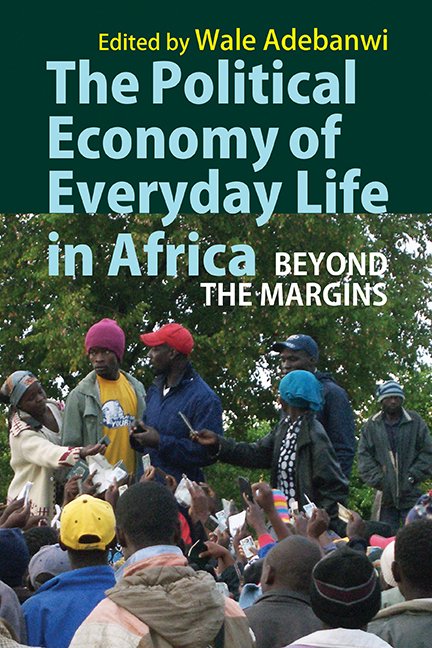Book contents
- Frontmatter
- Dedication
- Contents
- Maps, Illustrations & Tables
- Notes on Contributors
- Foreword
- Acknowledgements
- Approaching the Political Economy of Everyday Life An Introduction
- Part I MONEY MATTERS: CURRENCY & FISCAL LIFE STRUGGLES
- 1 Cattle, Currencies & the Politics of Commensuration on a Colonial Frontier
- 2 Currency & Conflict in Colonial Nigeria
- 3 Coercion or Trade? Multiple Self-realization during the Rubber Boom in German Kamerun (1899–1913)
- 4 The Macroeconomics of Marginal Gains Africa's Lessons to Social Theorists
- Part II LABOUR, SOCIAL LIVES & PRECARITY
- Part III MARGINALITY, DISAFFECTION & BIO-ECONOMIC DISTRESS
- Part IV HISTORICITY, TEMPORALITY, AGENCY & DEMOCRATIC LIFE
- Afterword: The Landscapes Beyond the Margins Agency, Optimization & the Power of the Empirical
- Index
3 - Coercion or Trade? Multiple Self-realization during the Rubber Boom in German Kamerun (1899–1913)
from Part I - MONEY MATTERS: CURRENCY & FISCAL LIFE STRUGGLES
Published online by Cambridge University Press: 31 August 2018
- Frontmatter
- Dedication
- Contents
- Maps, Illustrations & Tables
- Notes on Contributors
- Foreword
- Acknowledgements
- Approaching the Political Economy of Everyday Life An Introduction
- Part I MONEY MATTERS: CURRENCY & FISCAL LIFE STRUGGLES
- 1 Cattle, Currencies & the Politics of Commensuration on a Colonial Frontier
- 2 Currency & Conflict in Colonial Nigeria
- 3 Coercion or Trade? Multiple Self-realization during the Rubber Boom in German Kamerun (1899–1913)
- 4 The Macroeconomics of Marginal Gains Africa's Lessons to Social Theorists
- Part II LABOUR, SOCIAL LIVES & PRECARITY
- Part III MARGINALITY, DISAFFECTION & BIO-ECONOMIC DISTRESS
- Part IV HISTORICITY, TEMPORALITY, AGENCY & DEMOCRATIC LIFE
- Afterword: The Landscapes Beyond the Margins Agency, Optimization & the Power of the Empirical
- Index
Summary
One of the most inspiring ideas in Jane Guyer's rich oeuvre is her consistent attention to ‘marginal gains’ to be made by crossing disjuncture between different registers of value and knowledge. Especially her work from the 1990s on the role of ‘composition’ (in contrast to ‘accumulation’) as characteristic to economic agency in Equatorial Africa was most inspiring for both of us in our research in that area – notably for our efforts to make sense of the quite chaotic developments during the boom in wild rubber that marked so deeply the brief period of German rule in Cameroon (see Guyer 1993, 1986; Guyer and Eno Belinga 1995). No wonder, because there is a clear regional overlap: Guyer's examples in these articles come from the forest zones of Equatorial Africa, where the rubber boom took especially dramatic forms – in Cameroon under German rule as much as in the two Congos under the Belgians and the French. But even more than the regional fit, the original implications of these ideas were most stimulating to us. To simplify a very fine-grained line of argumentation: for Guyer it can be misleading to speak of ‘accumulation’ if one wants to understand the strong rivalry among ‘big men’ that marked relations in this area (as it still does). She proposes to use the term ‘accumulation’ in contexts where the aim is to accumulate the same on the same (as in capitalist accumulation: money on money). The rivalry between big men in her examples from Equatorial Africa is rather marked by ‘composition’ – the possibility of composing bundles of different forms of value and knowledge in order to claim pre-eminence; Guyer speaks also of ‘multiple self-realization’. Or to simplify even further: excellence in any field could be invoked in order to prevail in the confrontations with other big men that marked everyday life in these societies with their strong emphasis on personal achievement.
To one of us (Oestermann 2013), these ideas were inspiring for his efforts to make sense of the apparent readiness among many locals to become involved in the production and trading of wild rubber, a new product, the uncertain valuation of which developed under chaotic and often quite violent circumstances.
- Type
- Chapter
- Information
- The Political Economy of Everyday Life in AfricaBeyond the Margins, pp. 92 - 114Publisher: Boydell & BrewerPrint publication year: 2017

